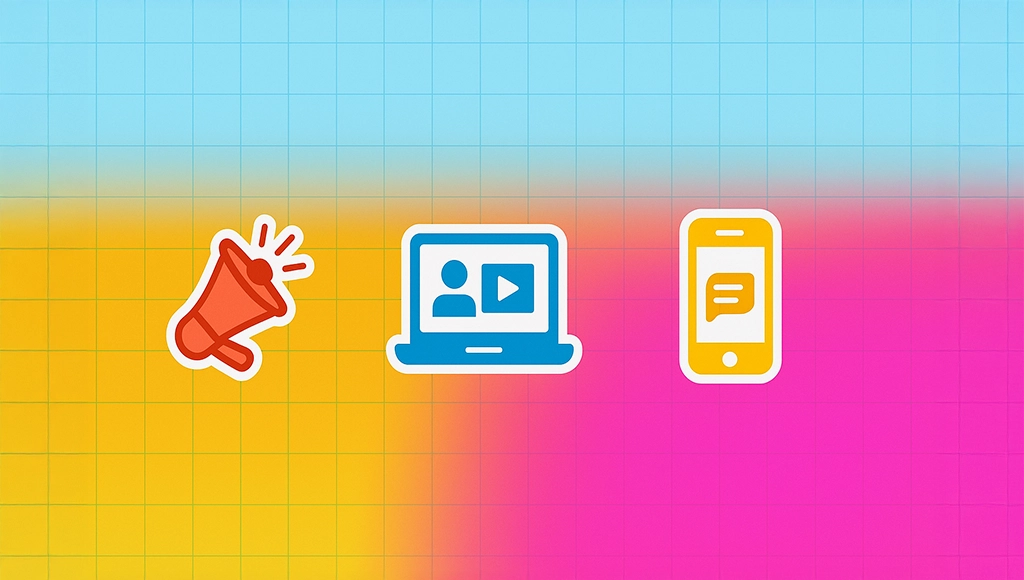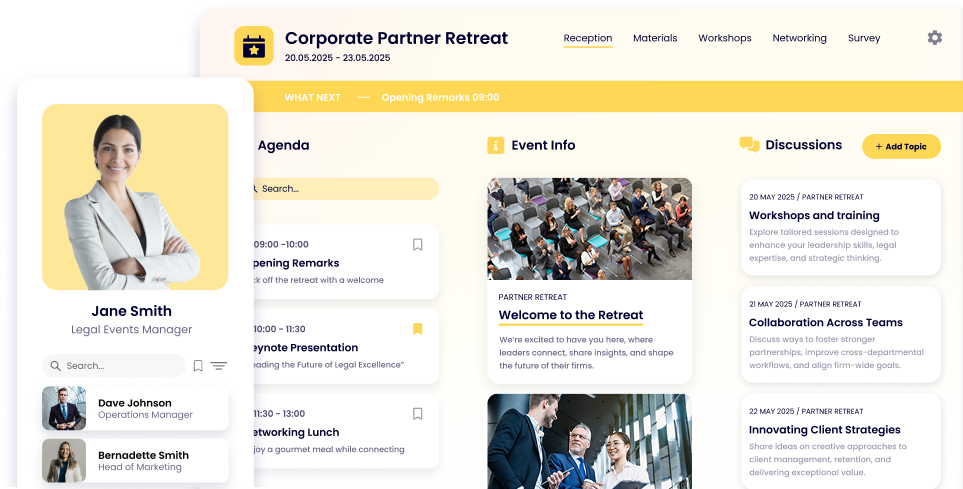Mastering Event Digital Marketing: Strategies for Maximum Engagement and Attendance

Lisa Broom | Head of Marketing

Need to promote your event and engage your audience effectively? Event digital marketing can help. This guide explains how you can use digital tools and strategies to increase attendance and enhance the attendee experience.
Key Takeaways
- Event digital marketing is essential for enhancing engagement and driving attendance through targeted strategies across various online platforms.
- Crafting a user-friendly event website and engaging content is crucial for providing attendees with all necessary information and maintaining their interest.
- Leveraging social media, email marketing, and innovative advertising techniques maximizes outreach and encourages a strong connection with potential attendees.
Understanding Event Digital Marketing
Event digital marketing encompasses a range of promotional strategies that leverage digital technologies to connect with audiences, drive attendance, and enhance engagement. Utilizing online platforms and tools allows event organizers to engage their audiences effectively and ensure their events stand out in a crowded marketplace. The importance of digital marketing in the event industry cannot be overstated, as it not only helps in promoting events but also enhances the overall experience for attendees.
The focus of event digital marketing is to improve outcomes and experiences for events by using technologies such as mobile phones, digital media, desktop computers, and the internet. This approach not only boosts brand visibility but also ensures that clear marketing goals are defined and achieved, making digital marketing an indispensable tool for modern event planners.
Adopting these strategies is vital for remaining relevant and competitive in today’s ever-evolving marketing landscape.
The Importance of Digital Marketing for Events
A well-structured digital marketing strategy can significantly streamline promotional efforts for events, making it easier to reach a wider audience and generate buzz. Promoting events across multiple digital channels increases the chances of reaching potential attendees and enhancing event visibility. Utilizing various digital platforms not only boosts the event’s reach but also encourages greater attendee engagement, creating a more memorable experience for everyone involved.
Interactive marketing techniques play a crucial role in fostering a memorable experience for the audience, thereby enhancing engagement and driving attendance. Identifying and understanding the target audience is key to the effectiveness of digital event marketing, as it allows for tailored content and messaging that resonates with potential attendees.
Digital marketing continues to play a vital role even after the event, helping maintain relationships with attendees and encouraging them to participate in future events. Regularly optimizing digital marketing content is necessary to maintain relevance and keep the audience engaged.
Continually refining and updating marketing efforts keeps events at the forefront of potential attendees’ minds, leading to increased brand awareness and event success.
Crafting a Custom Event Website
An event’s website serves as a central hub for information, registration, and updates, making it essential for driving attendance and engagement. A well-designed custom event website centralizes all necessary information, such as event details, session schedules, speaker bios, venue information, and ticket prices, providing a seamless experience for potential attendees. Offering a comprehensive and easy-to-navigate resource ensures attendees have all the information they need at their fingertips.
💡 Fliplet offers no-code solutions for building custom event websites and event apps that enhance user engagement and streamline attendee management.

Incorporating blog posts and regular updates into the event website can keep the content fresh and engaging, helping to maintain interest and excitement among prospective attendees.
Design for User Experience
Creating a streamlined user experience is the main goal when designing an event website. This involves ensuring the site is engaging, easy to navigate, and accessible across all devices.
Features that can significantly enhance user interaction include:
- FAQ sections
- Live chat options
- Polls
- Surveys
- Quizzes
These elements make the website more engaging and interactive. Secure payment gateways are also vital for registration and ticket sales, ensuring user security and trust.
Mobile responsiveness is crucial, as it ensures the website delivers a consistent experience on phones, tablets, and desktops. Maintaining a consistent user experience across different devices is essential for optimizing the event website for search engines.
Accessibility features like alt text for images and accessible navigation are also important for creating an inclusive event website. High-quality images, graphics, and professional photography further enhance the site’s visual appeal.
Engaging Content Creation
Engaging content is key to successful event marketing. This includes schedules, session details, speaker bios, maps, travel recommendations, testimonials, blog posts, and updates. Keeping the event website content fresh with regular updates is crucial for maintaining audience engagement and building a reputation as a reliable source of information. Testimonials can also enhance the event’s credibility by providing deeper insights and positive feedback from past attendees.

Real-time updates on the event website help manage attendee expectations and reduce confusion during schedule changes. Providing timely and accurate information ensures a smooth and enjoyable experience for attendees, leading to higher satisfaction and increased participation.
Leveraging Social Media Platforms
Social media platforms are powerful tools for event marketing, allowing organizers to engage with attendees, share updates, and foster excitement. Maintaining an active presence on social networks during events helps build anticipation for future events and encourages attendee interaction. Social media marketing acts as modern town squares, making them ideal for promoting events and fostering a sense of community.

Strategically using hashtags can increase engagement, allowing attendees to participate in discussions and share their experiences, thus broadening the event’s visibility. Utilizing various social media platforms allows event organizers to connect directly with their audience, share real-time updates, and create a sense of community around the event.
Engagement metrics like social media mentions provide valuable insights into attendee satisfaction and help improve future events.
Creating Effective Social Media Posts
Crafting engaging social media posts is an art. A mix of visuals, stories, and updates can attract and maintain audience interest. Polls, live Q&A sessions, event countdowns, and giveaways are types of interactive content that can enhance social media engagement. Incorporating visually appealing images in social media posts can significantly boost shares and audience interaction.
Informative video ads can effectively convey event details and benefits, helping to engage a wider audience. Creating a diverse range of content ensures the social media presence remains dynamic and captivating, driving higher engagement and participation.
Using Social Media Ads
Paid social media advertisements are a powerful tool for event promotion, allowing marketers to precisely target potential attendees based on demographics and interests. Social media advertising enables precise audience targeting, enhancing lead generation and event visibility. By utilizing display advertising, event organizers can enhance long-term brand recognition and reach potential attendees based on their interests.
Investing in paid social media ads ensures promotions reach the intended audience, driving higher attendance and engagement.
Email Marketing for Event Promotion
Email marketing is a crucial tool for connecting with potential attendees, building excitement, and communicating updates. Effective email communications improve attendee experiences and strengthen event outcomes. Segmenting email lists by interest, behavior, or demographics ensures the content delivered is tailored and relevant. Previous attendees might receive different messaging compared to first-time registrants to enhance engagement.
📊 Emails for event promotions boast an average open rate of 21.33% across industries. (Source: https://mailchimp.com/resources/email-marketing-benchmarks/)
Personalized email marketing nurtures relationships with potential attendees, making them feel valued and informed. Considerations like email personalization, compliance with regulations such as GDPR and CAN-SPAM, and obtaining consent when crafting campaigns are essential. A compelling subject line increases the likelihood of email open rates, improving campaign effectiveness.
Regularly testing email campaigns can help identify effective strategies to improve performance. Effective emails share crucial event details and valuable updates, driving engagement and conversions. Timely and engaging emails keep events top of mind, driving urgency and excitement for potential attendees.
Maximizing Mobile Marketing
Mobile marketing offers numerous opportunities to enhance experiences, drive engagement, and streamline participation. Integrating technologies like mobile event apps and contactless check-ins can significantly improve attendee interactions. Continual communication after registration builds anticipation and enhances attendee engagement.
Implementing these mobile marketing strategies can dramatically elevate the overall event experience and attendee satisfaction. Leveraging mobile marketing ensures events are accessible and engaging for participants on the go.
Utilizing Paid Digital Advertising
Paid digital advertising is a powerful tool for event promotion, with platforms like Facebook, Instagram, LinkedIn, and Google offering targeted advertising options. Pay-per-click (PPC) advertising is a cost-effective strategy for smaller events, providing rapid and targeted exposure. Paid search ads benefit event marketing by targeting individuals searching for events in specific industries or locations, offering a great return on investment when executed effectively.
When setting a budget for a PPC campaign, it should be realistic and flexible based on campaign goals. Monitoring performance helps ensure the effectiveness of advertising efforts, allowing for adjustments and optimization to maximize results.
Implementing Influencer Marketing
Influencer marketing is a strategy that uses trusted individuals to promote events and generate buzz. Influencers help enhance event visibility by creating authentic content and generating excitement among their followers. Encouraging influencers to produce authentic content fosters trust and makes promotions more relatable to their audience.
Choosing influencers who align with your event’s brand values and target audience is critical for effective promotion. Offering influencers exclusive perks such as VIP access or unique content can incentivize their participation in promoting your event.
Influencer marketing can greatly enhance the reach and engagement of an event, creating buzz and increasing attendance.
Enhancing Virtual and Hybrid Events
Hybrid events offer a combination of physical and virtual participation, increasing the potential audience significantly. These events attract a wider range of international speakers since geographical barriers are reduced. Offering virtual event options makes participation more inclusive and accessible for a broader audience.

Hybrid formats allow for better data collection on participant behavior, aiding future marketing efforts. Sponsors benefit from hybrid events as they can engage both in-person and virtual audiences, enhancing their exposure. Properly selected digital marketing tactics can provide a personalized and engaging experience for virtual attendees.
Measuring Success with Key Performance Indicators
The success of digital marketing efforts can be tracked through various key performance indicators (KPIs). Event KPIs guide the process of assessing the effectiveness of marketing strategies. Detailed analytics provided by digital marketing enable real-time tracking of campaign success, allowing for informed adjustments. Establishing clear goals is essential for determining which KPIs to track.
📊 Suggested KPIs to Track
| KPI | Why It Matters |
| Click-Through Rate (CTR) | Measures engagement with email/social posts |
| Conversion Rate | Tracks how many users registered from campaigns |
| Cost Per Acquisition (CPA) | Helps evaluate ad spend efficiency |
| Social Mentions | Gauges brand visibility and community buzz |
| Email Open Rate | Indicates effectiveness of subject lines |
Summary
Digital marketing empowers event organizers to reach wider audiences, foster engagement, and increase attendance with targeted, tech-savvy strategies. From building a custom event website to leveraging social media and paid advertising, each tactic contributes to a holistic strategy that can drive success. Start integrating these tips and elevate your event marketing today.
✅ Engagement Checklist: Digital Event Marketing Prep
- Define your event goals and audience.
- Create a mobile-optimized event website.
- Set up a branded hashtag.
- Schedule social media content in advance.
- Segment email lists and personalize messages.
- Launch retargeting campaigns with paid ads.
- Partner with industry influencers.
- Enable mobile check-in and contactless features.
- Track KPIs throughout the campaign lifecycle.
FAQs
What are the essential components of a custom event website?
A successful custom event website must feature essential components like event details, session schedules, speaker bios, venue information, and ticket prices. By including these elements, you’ll create an engaging experience that attracts attendees and keeps them informed!
How can social media enhance event marketing?
Social media can significantly boost your event marketing by fostering engagement and creating a vibrant community around your event. Leverage it to share updates and connect with your audience for a successful turnout!
Why is email marketing important for event promotion?
Email marketing is essential for event promotion because it effectively connects you with potential attendees, builds excitement, and delivers vital updates. Leverage this powerful tool to ensure your event’s success!
How do hybrid events benefit event organizers?
Hybrid events significantly enhance your audience reach and allow for engaging international speakers. By leveraging cost savings and improved data collection, you can create highly effective and impactful experiences for all participants.
What KPIs are important for measuring the success of digital marketing efforts?
To truly gauge the success of your digital marketing efforts, focus on key KPIs like click-through rates, conversion rates, social media engagement, and cost per customer acquisition. Tracking these metrics will empower you to refine your strategies and achieve greater results!





